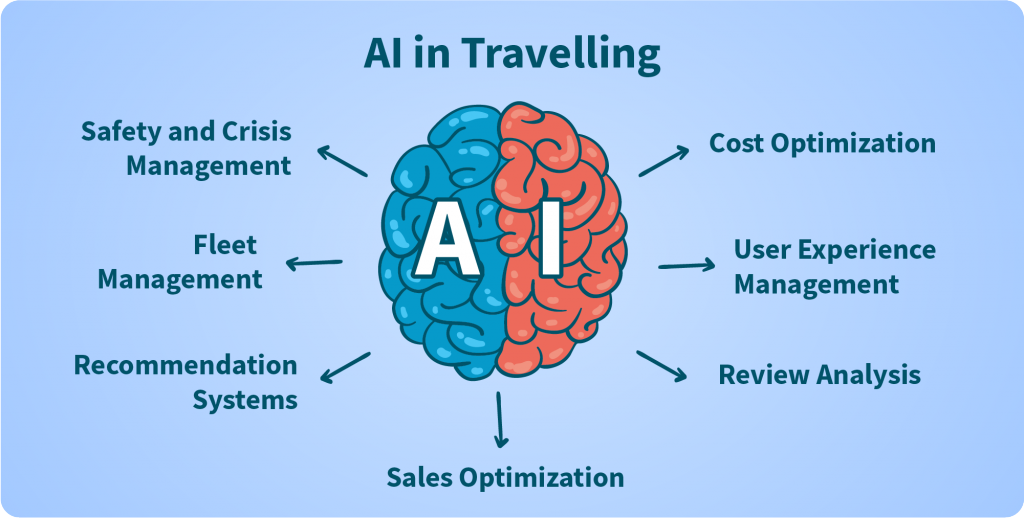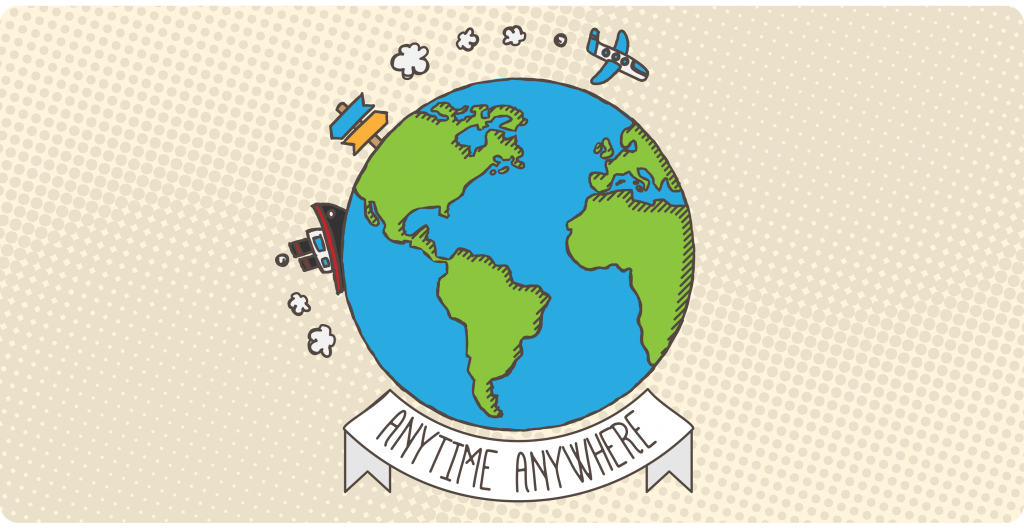In travel, the competition is fierce and companies shouldn’t put off differentiation any longer. Smart travelers are constantly comparing prices of flights, hotels, and car rentals to make sure that they get the best possible experience for their money. This means that to keep up with the modern pace of life, the tourism and travel industry needs to see to how to deploy the latest technology at hand. That’s when new AI innovations come into play with their huge potential to make travel faster, more efficient or more personalized.
written by:
Anastasia Borodinets
In travel, the competition is fierce and companies shouldn’t put off differentiation any longer. Smart travelers are constantly comparing prices of flights, hotels, and car rentals to make sure that they get the best possible experience for their money. This means that to keep up with the modern pace of life, the tourism and travel industry needs to see to how to deploy the latest technology at hand. That’s when new AI innovations come into play with their huge potential to make travel faster, more efficient or more personalized.
This is the continuation of our previous article “AI for Tourists. Part 1: Going on Vacation with a Robot Hand in Hand”. We discovered so many use cases of artificial intelligence in business that simply couldn’t fit them into one piece of writing.
Cost Optimization
Each user has specific characteristics, such as preferred days and time to fly, time to buy tickets, convenience, etc. A well-configured system can automatically detect the correct compensations between the price and the characteristics of the product and offer the relevant offers at the right time and at the optimal price.
The dynamic pricing technology fueled by AI can help detect purchase patterns so accurately and effectively that airlines can synchronize their pricing strategies in real time and present the right price at the right time.
Sales Optimization
AI-based software can train sales managers at all steps of the sales funnel. AI- and ML-driven software can also contribute to increasing the cross sell/sale of products via the respective app. If, for example, the customer prefers to rent a car on business trips and is looking for some hotel deals, the algorithm will get car rental offers from the entire set of suggestions.
Fleet Management
It’s not just humans who create huge amounts of data. Planes, trains, ships, and automobiles they travel in do so as well. By using AI to effectively interpret that data, companies will be able to improve how they maintain machinery to ensure safety and minimize downtime.
Boeing experimented with augmented reality that allowed engineers to see circuit diagrams in their planes laid over the real thing to find potential faults. Cruise ship maintenance teams applied AI and historic data to spot potential causes of engine failure up to ten months before the failure occurs. That kind of information prevents a lot of disappointment for travelers and saves a lot of money for operators.
Most disruption for airlines is completely beyond their control. A snow storm, ash cloud, or air traffic control strike can cause continental chaos at a moment’s notice, and is completely unavoidable. However, what airlines can control is how they look after the affected customers.
Artificial intelligence in tourism can make a real difference. For example, if a customer’s flight is cancelled, rather than just getting an SMS, a chatbot would jump into action offering the customer a booking on the next outbound flight. Bots can act as virtual guides, engaging in a conversation similar to a Q&A session.
Safety and Crisis Management
A tragic cause of disruptions on rail networks around the world is suicide, and it is extremely difficult to prevent using barriers or human monitoring. Tests in Canada have used AI image recognition to monitor CCTV from metro stations and alert station staff if someone appears to be at risk, and are being conducted in other locations.
For some people, business travel means going to the world’s most dangerous places. While it’s still in its early stages, travel security companies are starting to experiment with AI tools that allow them to monitor social media in order to identify risks earlier and take measures to ensure that their clients stay safe.
However, when things do go wrong, there are new AI innovations to help get things moving again.
Technology provider Cornerstone has developed software that allows travel agents to respond to crises and disruptions around the world by using their data to figure out which of their customers are affected, and working out the best way to get them home. Being proactive, rather than waiting for the customer to contact them, means that agents can make bookings faster and get people moving sooner.
Review Analysis
Another type of data that can be analyzed with the help of AI software is customer reviews. AI can help rapidly extract meaning and identify trends from a sea of reviews without human intervention. This insight can then be used to respond to customers through product or service changes or communications.
You can also apply artificial intelligence to your own data, not just customer data. For example, Kayak is using AI to predict whether flight prices are likely to increase or decrease and recommends an appropriate course of action.
User Experience Management
According to a report, 38% of people will stop engaging with a website if the content or layout is unattractive. Machine learning can infuse the client’s journey in different points: from inspiration, research, experience to sharing impressions with family and friends. Artificial intelligence can actively learn from each interaction on the website and, therefore, optimize the flow of users. AI & ML applied to UX will help to understand how the customer experience should be designed.
Using AI with 3rd party data could also help you better target your marketing. IBM has built technology which analyzes weather patterns to see when people respond best to weather-sensitive purchases, for example, booking holidays when the weather in your hometown is miserable.
Recommendation Systems
It is one thing to bring customers to your travel website or app but it, however, can be challenging to retain them and respond to customers’ increasingly complex expectations in the right manner. Hence, recommendation systems come into play. The footprints of each client on the travel platform allow the system to understand the needs, budget, and preferences of each client and suggest agreements that are appropriate. Delivering the right recommendations at the right time will help reinforce customer loyalty, making them come back again and again.
The recommendation systems enhanced by AI can feed on historical data such as previous reservations, behavior or data in real time of the traveler. For example, when the person opens the newsletter by email, he sends a signal to a data scientist to incorporate it into the next touch. After processing and aligning with the traveler’s context, an AI-based recommendation system can provide a superior experience.
As described by Phoebe Rogers, in an article published on Econsultancy, by recognizing where people are on their customer journey, brands can pinpoint the moments where they can have the biggest impact by delivering relevant, compelling content to help make the experience easier and more enjoyable.
When more data means fewer problems
There is no doubt that AI will keep shaping the way we travel in the future. Sometimes it will be obvious, as AI assistants help us book a flight, check in to a hotel or order lunch in a language we don’t speak at all. Other times, it could even come to our rescue and work out a complicated route home. But lots of times, it will be hidden in the algorithms that help to keep our planes, trains and automobiles running as smoothly as possible.
To find out more about our work with artificial intelligence, machine learning and our innovation programs, get in touch with our support team via request@qulix.com or visit our website.

Contacts
Feel free to get in touch with us! Use this contact form for an ASAP response.
Call us at +44 151 528 8015
E-mail us at request@qulix.com












